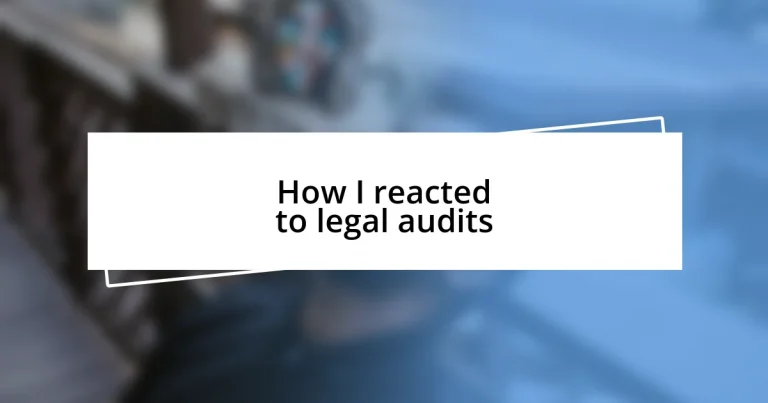Key takeaways:
- Legal audits serve as opportunities for growth and accountability, rather than punitive measures; they reveal strengths alongside areas needing improvement.
- Proactive preparation, including document organization and internal reviews, enhances audit outcomes and promotes team collaboration.
- Embracing feedback and post-audit reflection fosters continuous improvement and resilience, transforming challenges into valuable learning experiences.
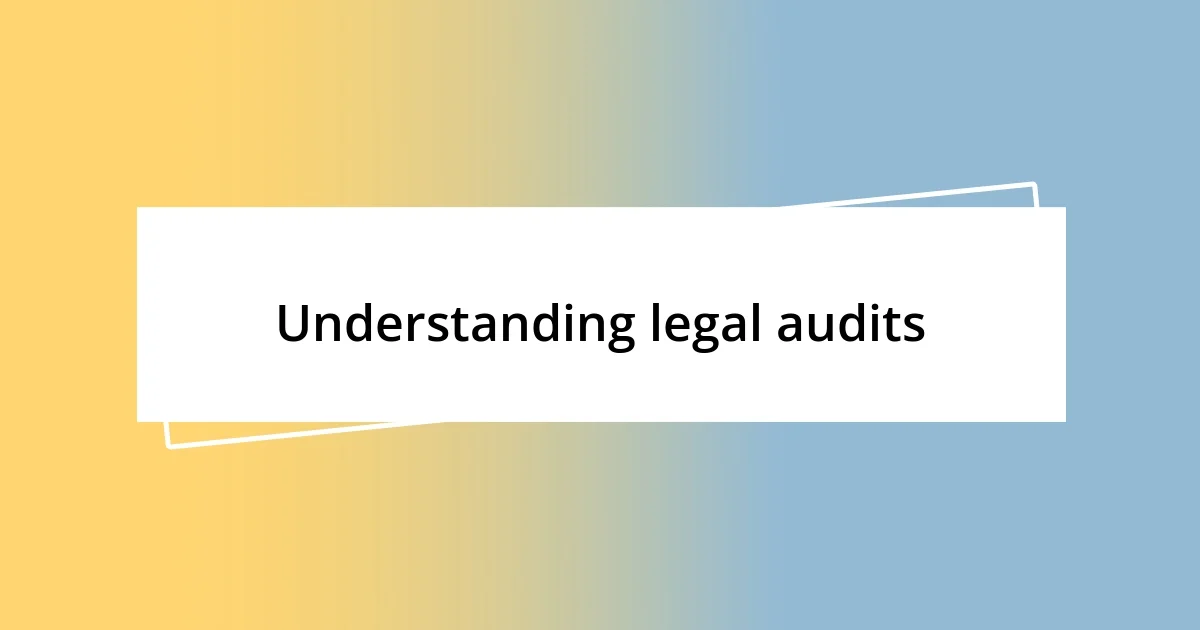
Understanding legal audits
Legal audits can feel overwhelming, can’t they? From my own experience, the entire process can be a bit intimidating, yet it’s an essential part of ensuring compliance and identifying potential legal risks. At its core, a legal audit is a systematic examination of a company’s operations and records to ensure they align with applicable laws and regulations.
I remember grappling with a particularly tough audit at a previous job. It was like peeling back the layers of an onion—every layer revealed different challenges and potential liabilities. This deep dive not only exposed areas needing improvement but also fostered a culture of accountability within our team, ultimately enhancing our processes.
One of the most crucial insights I gleaned from my audits is that they aren’t necessarily punitive; rather, they’re opportunities for growth. Have you ever noticed how sometimes a little scrutiny can shine a light on hidden strengths? That’s what legal audits can do—they bring to the forefront what’s working well alongside what needs attention, which can be incredibly empowering in the long run.
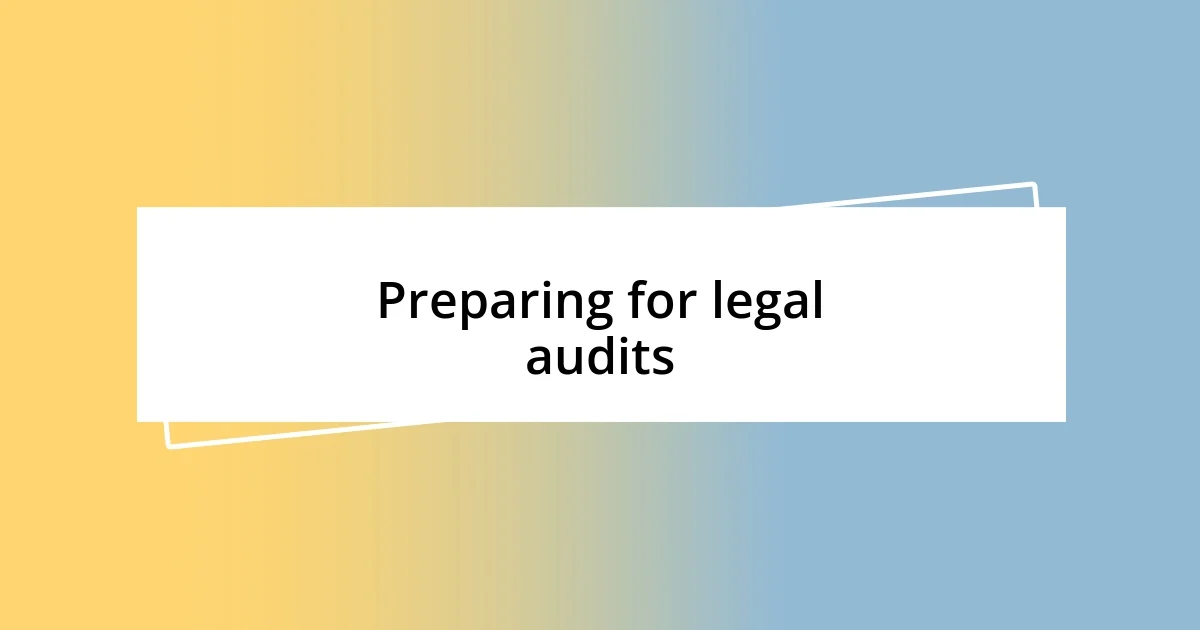
Preparing for legal audits
Preparing for legal audits requires a proactive mindset. I recall a compliance officer once advising me to assume a legal audit is like preparing for a big exam. You wouldn’t just show up on the day without studying, right? Gathering all relevant documents, contracts, and policies ahead of time can significantly reduce anxiety. Having everything organized brings a sense of control during what can be an unpredictable process.
I found it incredibly valuable to conduct an internal review before the official audit. Imagine a rehearsal before a performance: it gives you an opportunity to identify potential hiccups early on. This approach allowed my team and me to address issues and clarify uncertainties, significantly improving our outcomes. Plus, it fostered collaboration—everyone contributed their perspectives, making it a team effort.
One unexpected benefit I encountered during preparation was a heightened awareness of our compliance landscape. As we dug into policies and procedures, we recognized gaps that might have otherwise gone unnoticed. This kind of reflection not only prepares you for the audit but also positions the organization for future success by strengthening overall governance.
| Preparation Strategy | Benefits |
|---|---|
| Document organization | Increases control and reduces anxiety |
| Internal reviews | Identify issues and encourage collaboration |
| Reflecting on compliance | Strengthens overall governance and success |
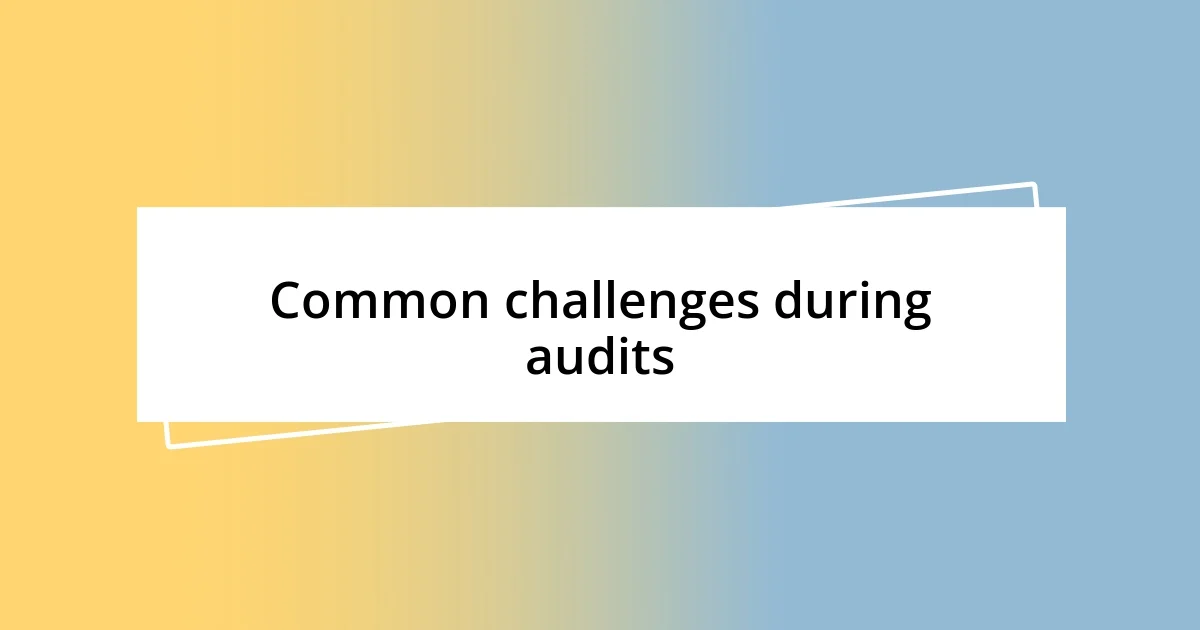
Common challenges during audits
The audit process can present several challenges that feel daunting at first. From my experience, unexpected questions from auditors often caught me off guard, making me realize how crucial it is to be thoroughly prepared. I’ve learned that communication gaps within the team can amplify these challenges, leading to confusion during the audit. It’s all too easy for misunderstandings to arise when everyone isn’t on the same page.
Here’s a look at some common challenges that can pop up during audits:
- Unexpected Questions: Auditors might dig into areas you didn’t anticipate, which can throw your team off balance.
- Documentation Issues: Missing or incomplete documents can halt the audit flow, resulting in unnecessary delays.
- Team Misalignment: If team members aren’t communicating effectively, it can lead to inconsistencies in responses.
- Time Pressure: The looming deadline often adds stress, which can impact the quality of information provided.
I’ll never forget when an auditor asked about compliance training. My heart raced a little—I realized we hadn’t documented some training sessions thoroughly. This wake-up call underscored the importance of keeping detailed records. It’s not just about passing the audit; it’s about being equipped with the knowledge and resources to respond accurately and confidently. Embracing these challenges can actually turn the audit experience into a valuable learning opportunity if approached with the right mindset.

My initial reactions to audits
My initial reactions to audits were a mix of anxiety and curiosity. I remember the first time I learned about an impending audit; my heart sank a bit. I had visions of auditors rifling through every document and finding something I overlooked. What if I missed a crucial piece of information? It felt like I was about to take a test where every question could count against me.
Over time, though, those feelings shifted. I began viewing audits as opportunities for growth rather than threats. I remember a particularly eye-opening moment during one audit when I realized I had actually learned something valuable about our operational practices. Instead of being defensive, I started to engage with the auditors. I asked them for feedback on our processes, which opened up a constructive dialogue that I hadn’t anticipated. Have you ever thought that an uncomfortable situation could lead to valuable insights? It truly can.
Looking back, my relationships with auditors changed too. Initially, I saw them as adversaries; now, I regard them as partners in a shared journey toward improvement. I recall one auditor who took the time to explain how certain compliance requirements had evolved. Understanding that made my job easier and less stressful in the long run. This perspective shift not only eased my initial apprehension but transformed how I approached audits altogether. How about you? Have you had similar experiences where fear turned into understanding?
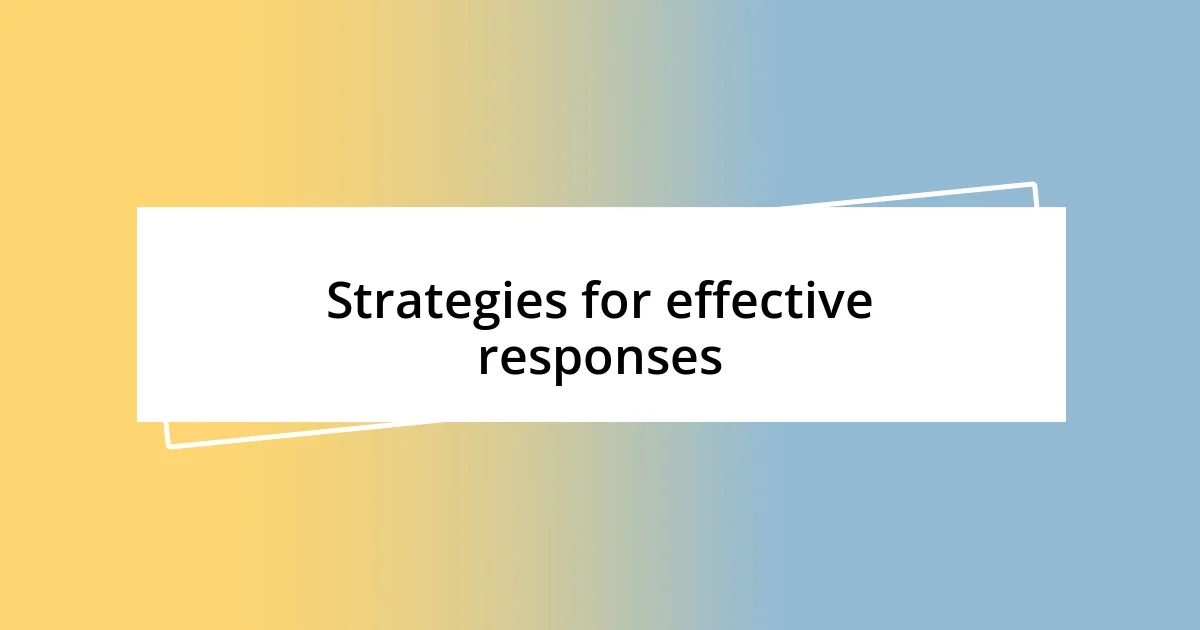
Strategies for effective responses
It’s essential to stay organized during an audit. I learned the hard way that keeping documents easily accessible can save hours of stress. When I faced an audit with incomplete paperwork, panic set in, but I quickly adapted by establishing a centralized digital filing system that streamlined future audits. Have you considered how being organized could ease your audit experience?
Open communication is another critical strategy. I used to rely solely on email for updates, but I found that brief, regular meetings worked wonders. These check-ins not only aligned our team but also encouraged everyone to voice concerns early on, transforming our approach to audits. Imagine the relief of tackling issues proactively rather than scrambling at the last minute!
Lastly, I recommend adopting a positive mindset. Instead of viewing audits as an intrusion, I began seeing them as a chance to showcase our hard work and areas for improvement. This shift empowered me to prepare thoroughly and even celebrate successful outcomes. How do you perceive the audit process? Embracing it could very well change your approach for the better.

Lessons learned from audits
When I reflect on the audits I’ve experienced, one crucial lesson stands out: the value of preparation. I vividly recall a particularly nerve-wracking audit where I was caught off guard by last-minute requests for documentation. That day, I learned that having a comprehensive checklist not only reduces anxiety but also ensures that nothing falls through the cracks. Have you ever been in a situation where you were unprepared and the stress just compounded? I certainly have, and it’s a feeling I aim to avoid now.
Another key takeaway was the importance of being open to feedback. I remember one auditor who gently pointed out gaps in our compliance reporting. Instead of becoming defensive, I chose to absorb the criticism, which ultimately led me to implement stronger tracking systems. This moment taught me that feedback isn’t just noise; it’s a pathway to improvement. How often do we let our pride get in the way of progress? Embracing constructive feedback is something I now consider invaluable.
Lastly, I discovered that post-audit reflection can be a game changer. After each audit, I began scheduling a team debrief to discuss our strengths and weaknesses. I still recall the sense of camaraderie that developed in these sessions, as we collectively acknowledged what worked well and what didn’t. This not only reinforced our team spirit but also set the stage for continuous improvement. Have you ever turned a potentially negative experience into a learning opportunity? It’s remarkable what a shift in perspective can achieve.
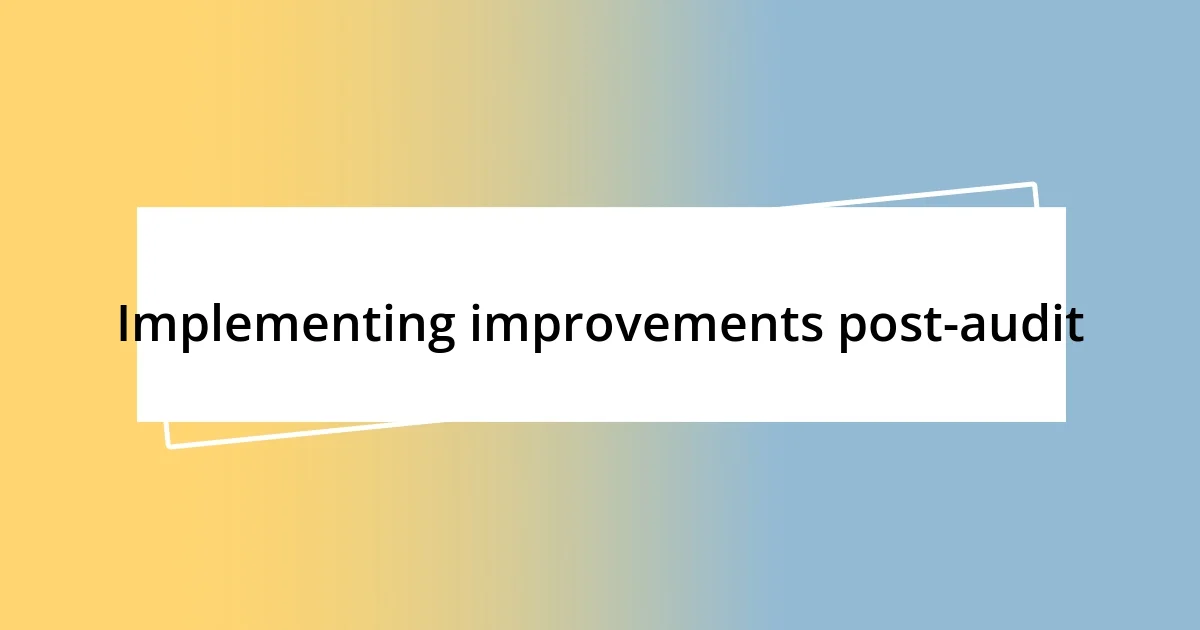
Implementing improvements post-audit
One of the first things I did after an audit was wrap my head around the identified issues and take actionable steps. I vividly remember a situation where we were flagged for inconsistent tracking of our compliance metrics. I gathered my team for a brainstorming session, and it was enlightening to see everyone contribute their ideas freely. How often do you find that the best solutions come when you involve your team in the discussion? This collective effort made implementing new monitoring tools not only smoother but more effective.
As we integrated improvements, I learned the importance of setting clear benchmarks to measure progress. I vividly recall the anxiety I felt when we didn’t track our compliance effectively in previous audits. By establishing specific targets and regular check-ins, I felt a renewed sense of control and clarity. Have you ever noticed how tangible goals can transform the way you approach challenges? This strategy kept our focus sharp and motivated everyone to strive for excellence.
Finally, I realized that improvement doesn’t stop after implementing changes. A genuine commitment to continuous learning became a cornerstone for our team. After each audit, I made it a point to gather insights and explore further training opportunities. Reflecting on my past, I can’t emphasize enough how this culture of growth fostered resilience within our team. Don’t you think that investing in ongoing education can turn any setback into a springboard for future success?












